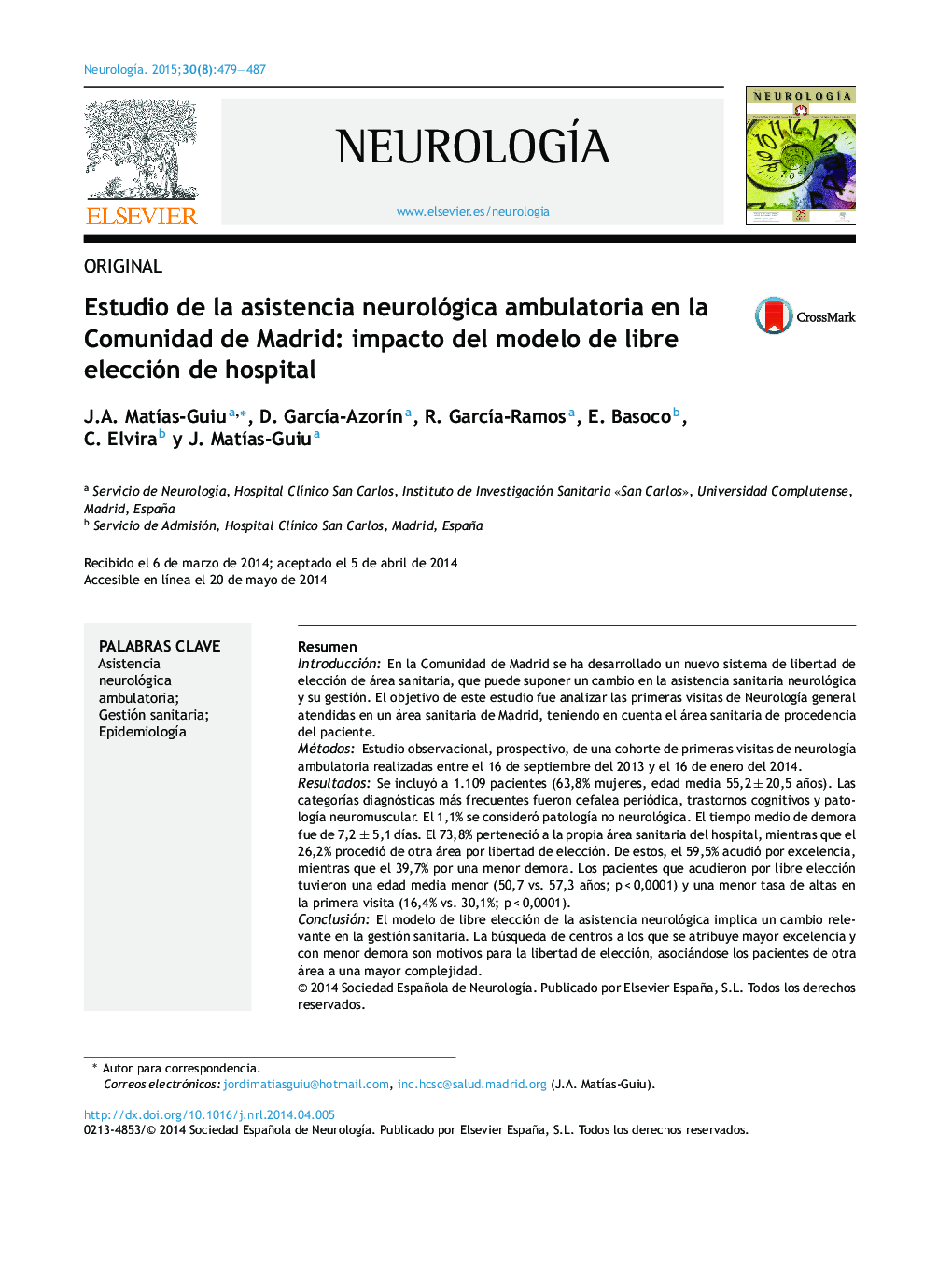| کد مقاله | کد نشریه | سال انتشار | مقاله انگلیسی | نسخه تمام متن |
|---|---|---|---|---|
| 3075748 | 1189032 | 2015 | 9 صفحه PDF | دانلود رایگان |
ResumenIntroducciónEn la Comunidad de Madrid se ha desarrollado un nuevo sistema de libertad de elección de área sanitaria, que puede suponer un cambio en la asistencia sanitaria neurológica y su gestión. El objetivo de este estudio fue analizar las primeras visitas de Neurología general atendidas en un área sanitaria de Madrid, teniendo en cuenta el área sanitaria de procedencia del paciente.MétodosEstudio observacional, prospectivo, de una cohorte de primeras visitas de neurología ambulatoria realizadas entre el 16 de septiembre del 2013 y el 16 de enero del 2014.ResultadosSe incluyó a 1.109 pacientes (63,8% mujeres, edad media 55,2 ± 20,5 años). Las categorías diagnósticas más frecuentes fueron cefalea periódica, trastornos cognitivos y patología neuromuscular. El 1,1% se consideró patología no neurológica. El tiempo medio de demora fue de 7,2 ± 5,1 días. El 73,8% perteneció a la propia área sanitaria del hospital, mientras que el 26,2% procedió de otra área por libertad de elección. De estos, el 59,5% acudió por excelencia, mientras que el 39,7% por una menor demora. Los pacientes que acudieron por libre elección tuvieron una edad media menor (50,7 vs. 57,3 años; p < 0,0001) y una menor tasa de altas en la primera visita (16,4% vs. 30,1%; p < 0,0001).ConclusiónEl modelo de libre elección de la asistencia neurológica implica un cambio relevante en la gestión sanitaria. La búsqueda de centros a los que se atribuye mayor excelencia y con menor demora son motivos para la libertad de elección, asociándose los pacientes de otra área a una mayor complejidad.
IntroductionA new model permitting free choice of hospital has been introduced in the Region of Madrid. This may result in changes in how outpatient neurological care is provided and managed. The purpose of this study is to analyse initial visits to a general neurology department in the Region of Madrid and record the health district corresponding to each patient's residence.MethodsObservational and prospective study of a cohort of patients making initial outpatient visits to a neurology department between 16 September 2013 and 16 January 2014.ResultsThe study included 1109 patients (63.8% women, mean age 55.2 ± 20.5). The most frequent diagnostic groups were periodic headache, cognitive disorders, and neuromuscular diseases. Non-neurological diseases were diagnosed in 1.1% of the cases. The mean time of delay was 7.2 ± 5.1 days. Residents within the hospital's health district made up 73.8% of the total, while 26.2% chose a hospital outside of the health district corresponding to their residences. In the latter group, 59.5% made the choice based on the level of care offered, while 39.7% changed hospitals due to shorter times to consultation. The patients who came from another health district were younger (50.7 vs 57.3, P<.0001) and had a lower rate of discharges on the first visit (16.4% vs 30.1%, P<.0001).ConclusionThe model of free choice of hospital delivers significant changes in healthcare management and organisation. Reasons given for choosing another hospital are more ample experience and shorter delays with respect to the home district hospital. Management of patients from outside the health district is associated with greater complexity.
Journal: Neurología - Volume 30, Issue 8, October 2015, Pages 479–487
